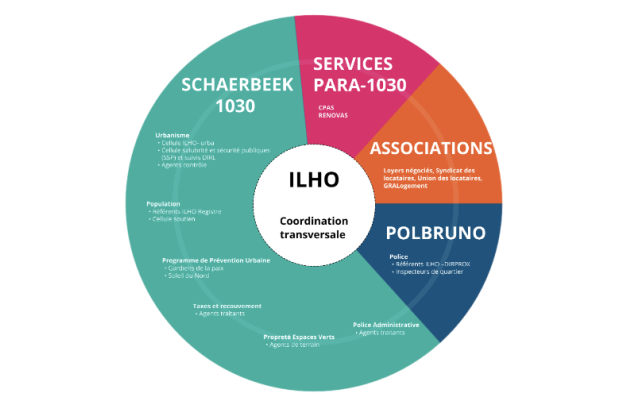Date of label : 29/10/2024
-
Schaerbeek , Belgium
-
Size of city : 131.993 inhabitants

Housing in Schaerbeek graphic
Summary
The ILHO (Investigation Logement Huisvesting Onderzoek) housing investigation system in Schaerbeek (BE) mobilises a multidisciplinary team, including municipal departments (urban planning, population, debt recovery, etc.) and external partners (police, neighbourhood associations, etc.) to combat inadequate housing and exploitative landlords. The system prevents landlords enriching themselves at the expense of vulnerable tenants.
The system also enhances knowledge of local buildings, and better connects administrative data in a territory, to identify who lives in each home. By connecting house owners with organisations that help renovate buildings and support tenants, the ILHO aims to improve housing quality and tenants’ well-being.
The solutions offered by the Good Practice
The ILHO (Investigation Logement Huisvesting Onderzoek) housing investigation system in Schaerbeek aims to improve housing quality, and thereby residents’ quality-of-life. By integrating data from different sources, ILHO identifies housing with serious health and safety problems, such as inadequate ventilation or high levels of humidity.
ILHO officers visit prioritised homes (with planning, police and other authorities, if necessary) and a report is sent to the Public Prosecutor's Office to pursue any criminal actions against landlords.
The ILHO also contacts landlords to urge them to take necessary steps to renovate inadequate buildings, and assists tenants with their social and legal needs.
Finally, the ILHO updates administrative data across various data sources (population, police, urban planning, taxes, etc.), and shares information gathered with partner organisations.
Building on the sustainable and integrated urban approach
The ILHO system addresses environmental, economic and social aspects of housing issues in Schaerbeek, focusing on substandard housing, overcrowding in buildings, exploitation of vulnerable residents, and poor living conditions.
Environmental aspects: ILHO encourages homeowners to renovate their building to improve energy performance. RenovaS, a partner organisation, offers free technical and planning guidance for renovating homes, as well as financial assistance.
Economic aspects: ILHO coordinates efforts across several municipal, para-municipal, and external services, to achieve better administration of data between services and improve impact at local level. It also seeks out new collaborations to gain a better understanding of housing conditions on the ground.
Social aspects: ILHO supports vulnerable people in administrative procedures to improve the quality of their living conditions, and helps renters stay in their homes or to search for new accommodation if necessary. By clarifying who lives where, ILHO also strengthens municipal capacity in the event of a fire or other disaster.
Based on participatory approach
The ILHO operates as a cross-functional system, jointly coordinated by the urban planning and population departments, which share information between partners to ensure the system runs effectively.
The methodology involves sharing structured information via databases, a common mailing list, and regular partner meetings. For example, the police notify urban planning of tenant numbers and accommodation status after inspections. The population department alerts partners about unauthorised housing registrations, while the urban planning department gathers information and shares its analyses with partners.
ILHO collaborates with the Regional Housing Inspection Directorate (DIRL), the Public Prosecutor's Office, and the gas and electricity utility Sibelga. A broader "Housing Platform" meets every two months to discuss solutions to problems, both with landlords and tenants (though they are not invited to these meetings). ILHO also takes part in meetings with other municipalities to exchange best practices.
What difference has it made?
The ILHO scheme has achieved notable results over the past 9 years:
- It has worked on 137 buildings, benefitting 1 000 households.
- Of these 137 buildings, around 350 were authorised and 760 found to unauthorised accommodation.
- Around 90 planning permission applications were submitted following ILHO interventions.
- Around 20% of buildings were sold to new owners.
- Five owners were prosecuted (following “Sleep merchants” files opened by the police).
- RenovaS provided renovation assistance to many building owners.
Currently, ILHO agents are analysing data from these buildings to assess achievements. In compliance with GDPR, personal data can be shared only between the municipal urban planning and population departments, not with external partners.
Why this Good Practice should be transferred to other cities
The ILHO contributes to sustainable urban development, social cohesion, and equitable access to housing and services, aligning with key policy objectives:
- Sustainable Development Goal (SDGs): SDG 11 (Sustainable cities and communities), SDG 1 (No poverty) and SDG 10 (Reduced inequality).
- The Urban Agenda for the EU, by addressing urban poverty through social inclusion and neighbourhood regeneration, and the Territorial Agenda 2030 by improving housing and social inclusion.
ILHO’s governance system, involving a multidisciplinary team across departments, is transferable, and adaptable to other city contexts, both in Belgium and at EU level, given legislation differences between countries.
Key elements for replication include:
- Understanding the general housing situation in the area.
- Identifying partners and the legislative framework of each partner.
- Assessing the state-of-the-art to combat the substandard housing problem.
- A project manager for multi-level coordination.
- Political backing for the scheme’s implementation.
Other municipalities in Belgium have emulated the ILHO system. Anderlecht municipality created the “Dignity system”, and the City of Brussels and Ixelles municipality adopted similar models and platforms. The ILHO team regularly presents its approach at intermunicipal meetings, such as those organised by the Association of Towns and Municipalities (Brulocalis).
